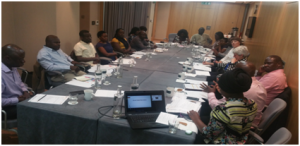
 Background
Background
The World Health Organization has previously identified the emigration of healthcare workers as the most critical problem facing health systems in African countries. However, despite this documented negative impact of the brain drain of health professionals from Africa, there is an argument that transnationally oriented medical migrants (or diasporas) can act as development agents for their countries of origin. Financial remittances, in particular, are said to have substantial potential for transformative development and can reduce the number of people living in poverty. African countries are also expected to benefit from the transfer of knowledge and skills, which is exchanged through the return of health professionals from abroad.
Ugandan medical diasporas as a foundation for sustainable health development in Uganda
Since Uganda’s past economic and political crisis led to the emigration of many healthcare workers whose skills and experience are valued in other countries, engaging those diasporas has been a key policy of the current Ugandan government, which has set up a Diaspora Desk.
In the wake of Lord Crisp’s report, “Global health partnerships: the UK contribution to health in developing countries,” steps have been taken to support healthcare professionals who wish to volunteer in developing healthcare systems, for example, for Uganda the Uganda UK Health Alliance was established to assist with this. However, it’s been a challenge to ensure that these volunteering activities result in a positive and sustainable impact for both parties, which is why we reached out to Ugandan health diasporas in the UK.
Setting the stage with roundtable discussions
 On 14 August 2015, a roundtable discussion took place at the Royal Society of Medicine, with the support of Joyce Kakuramatsi Kikafund, high commissioner of Uganda to the United Kingdom, and the leaders of the Uganda UK Health Alliance. These discussions involved the leaders of key Ugandan health diaspora organisations in the UK including: Doctors For Africa, Uganda Diaspora Health Foundation, Health Uganda Group Sheffield, Uganda Diaspora Engagement, and Liverpool Health Uganda Diaspora Group.
On 14 August 2015, a roundtable discussion took place at the Royal Society of Medicine, with the support of Joyce Kakuramatsi Kikafund, high commissioner of Uganda to the United Kingdom, and the leaders of the Uganda UK Health Alliance. These discussions involved the leaders of key Ugandan health diaspora organisations in the UK including: Doctors For Africa, Uganda Diaspora Health Foundation, Health Uganda Group Sheffield, Uganda Diaspora Engagement, and Liverpool Health Uganda Diaspora Group.
The discussions provided new insights into the nature of Ugandan medical diasporas: their motivations for engaging in global health; the links which they maintain with Uganda; the prospect of them returning to Uganda; and their interest in making their skills, knowledge, and resources available to their native country in the future.
Diaspora leaders also called upon health diaspora organisations to mobilise, share a common vision, collaborate with one another, and foster strategic leadership in global health work between the UK and Uganda. The result of this thinking is a newly formed umbrella organisation called the Uganda Diaspora Health Association, which will work with the Uganda UK Health Alliance, through the Global Health Exchange.
We learnt that there is considerable international enthusiasm around the idea of engaging health diasporas and, given the low likelihood of permanent return for Ugandan healthcare diasporas, engagement with these workers offers the best policy alternative for Uganda.
This Ugandan medical diaspora meeting has shown that there is a large amount of goodwill among the Ugandan healthcare diaspora in the UK, with many willing to contribute in various ways to the redevelopment of Uganda and the UK’s health delivery systems. However, this could be in the form of contributing for short periods of time in Uganda and going back to their bases in the UK, where they can also innovate healthcare services through the learning they’ve brought back.
Moses Wasswa Mulimira is a post graduate research student in evidence based healthcare studies, Oxford University. He is the co-founder of the Uganda Diaspora Health Foundation.
Mariam Namulindwa Aligawesa is co-vice chair at the Butabika-East London NHS Link. She is co-founder of the Uganda Diaspora Health Foundation.
Competing interests: We have read and understood BMJ policy on declaration of interests and declare the following interests: None.
Thanks to the Uganda medical diaspora workshop contributors, including:
1) Dr Tamara Bugembe (president, Doctors for Africa)
2) Patricia Bugembe (Health Uganda Group Sheffield)
3) William Mutenza (Uganda Diaspora engagement)
4) William Nkata (East African Healthcare Forum)
5) Justine Nakimuli (Liverpool Uganda Health Diaspora Group)
6) Professor Rajan Madhok (programme director, Global Health Exchange)